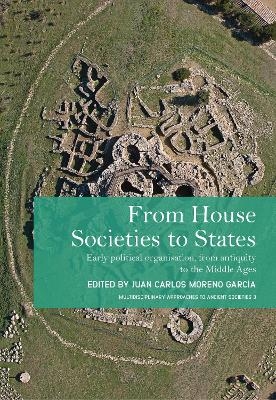
From House Societies to States
Oxbow Books (Verlag)
978-1-78925-862-2 (ISBN)
The organisation and characteristics of early and ancient states have become the focus of a renewed interest from archaeologists, ancient historians and anthropologists in recent years. On the one hand, neo-evolutionary schemas of political transformation find it difficult to define some of their most basic concepts, such as ‘chiefdom’, ‘complex chiefdom’ and ‘state’, not to mention the transition between them. On the other hand, teleological interpretations based on linear dynamics, from less to increasingly more complex political structures, in successive steps, impose biased and too rigid views on the available evidence. In fact, recent research stresses the existence of other forms of socio-political organisation, less vertically integrated and more heterarchical, that proved highly successful and resilient in the long term in tying together social groups. What is more, such forms quite often represented the basic blocks on which states were built and that managed to survive once states collapsed. Finally, nomadic, maritime and mountain populations provide fascinating examples of societies that experienced alternative forms of political organisation, sometimes on a seasonal basis. In other cases, their consideration as ‘marginal’ populations that cultivated specialised skills ensured them a certain degree of autonomy when living either within or at the borders of states.
This book explores such small-scale socio-political organisations, their potential and the historical trajectories they stimulated. A selection of historical case studies from different regions of the world may help rethink current concepts and views about the emergence and organisation of political complexity and the mechanisms that prevented, occasionally, the emergence of solid polities. They may also cast some light over trajectories of historical transformation, still poorly understood as are the limits of effective state power. This book explores the importance of comparative research and long-term historical perspectives to avoid simplistic interpretations, based on the characteristics of modern Western states abusively used retrospectively.
Juan Carlos Moreno García (PhD in Egyptology, 1995) is a CNRS senior researcher at the Sorbonne University. He has published extensively on pharaonic administration and socio-economic history in a comparative perspective and has organised several conferences on these topics. Recent publications include Markets and Exchanges in Pre-modern and Traditional Societies (2021), The State in Ancient Egypt (2019) and Dynamics of Production in the Ancient Near East, 1300–500 BC (2016).
Contributors_x000D_
_x000D_
 _x000D_
_x000D_
1. From house societies to states: An introduction_x000D_
_x000D_
Juan Carlos Moreno García_x000D_
_x000D_
2. The great houses of Mesopotamia: tripartite houses and the formation of the City State_x000D_
_x000D_
Pascal Butterlin_x000D_
_x000D_
3. Egalitarism, hierarchy, heterarchy and homoarchy: which evidence for the Indus Valley Civilization?_x000D_
_x000D_
Massimo Vidale_x000D_
_x000D_
4. Houses, regions and state(s): Multiple political experiences in pharaonic Egypt _x000D_
_x000D_
Juan Carlos Moreno García_x000D_
_x000D_
5. Communities, ÔÇÿhousesÔÇÖ, and political organization in the Mycenaean world_x000D_
_x000D_
Dimitri Nakassis_x000D_
_x000D_
6. Emergence and legitimation of princely authority in the Early Bronze Age of Central Germany _x000D_
_x000D_
Harald Meller_x000D_
_x000D_
7. Neighbourhoods as ÔÇÿhouse societiesÔÇÖ in ancient Teotihuacan, Central Mexico. Exclusionary organizations in a corporate social and political environment_x000D_
_x000D_
Linda Manzanilla_x000D_
_x000D_
8. House Societies and the Classic Maya: An Epigraphic View _x000D_
_x000D_
James L. Fitzsimmons_x000D_
_x000D_
9. Gathering Salinar houses: Platforms-as-assemblages in ancient coastal Peru_x000D_
_x000D_
David Chicoine & Jacob Warner_x000D_
_x000D_
10. Communities, urbanism and state building in the Lake Chad region_x000D_
_x000D_
Carlos Magnavita & Scott MacEachern_x000D_
_x000D_
11. Negotiating visions of the house in West Africa: From dispersed agricultural communities to alternative complexities to the state_x000D_
_x000D_
Stephen Dueppen_x000D_
_x000D_
12. Early Medieval state formation: A view from two peripheries_x000D_
_x000D_
Julio Escalona Monge_x000D_
_x000D_
13. Trading polities and ÔÇ£sea peopleÔÇØ of maritime southeast Asia_x000D_
_x000D_
B├®r├®nice Bellina
| Erscheinungsdatum | 08.11.2022 |
|---|---|
| Zusatzinfo | B/w |
| Verlagsort | Oxford |
| Sprache | englisch |
| Maße | 170 x 240 mm |
| Themenwelt | Geisteswissenschaften ► Archäologie |
| Geschichte ► Allgemeine Geschichte ► Vor- und Frühgeschichte | |
| ISBN-10 | 1-78925-862-6 / 1789258626 |
| ISBN-13 | 978-1-78925-862-2 / 9781789258622 |
| Zustand | Neuware |
| Haben Sie eine Frage zum Produkt? |
aus dem Bereich


